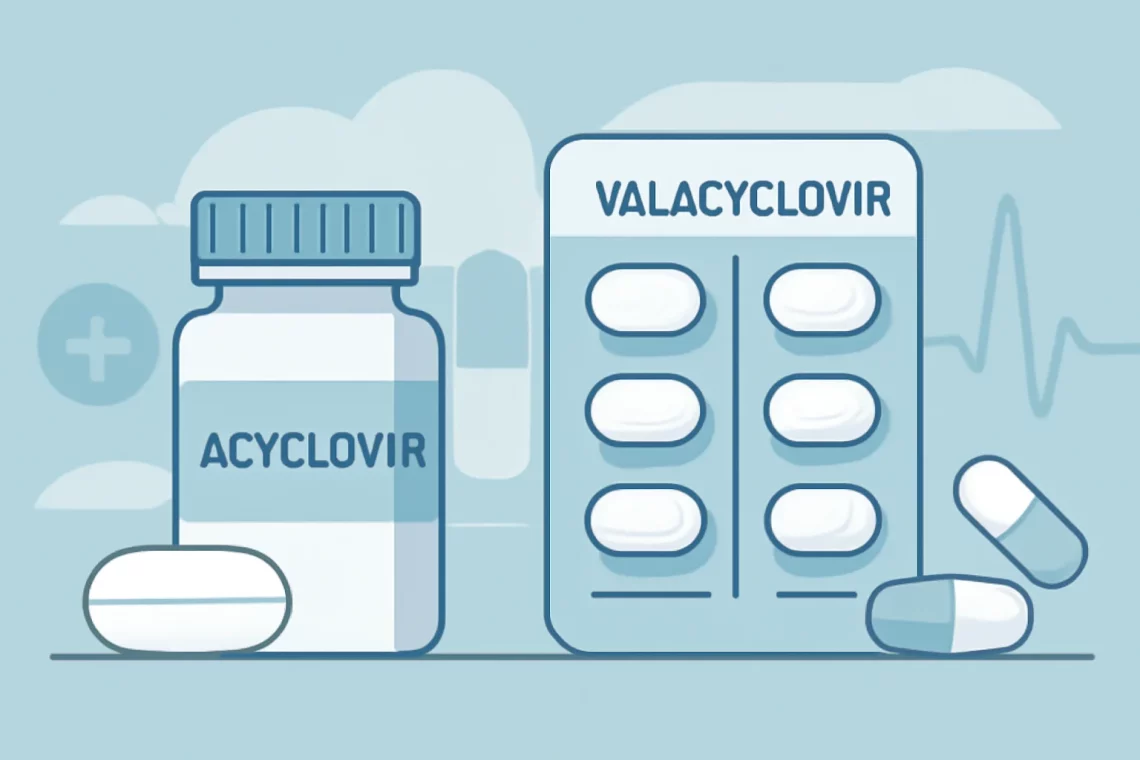
Acyclovir vs Valacyclovir: Which is the Better Choice for Treatment?
Acyclovir and valacyclovir are two antiviral medications commonly used to treat infections caused by certain types of viruses. Both drugs are primarily prescribed for conditions related to the herpes virus, which can manifest in various forms, including genital herpes, shingles, and cold sores. The importance of understanding the differences and similarities between these two medications cannot be overstated, as they play a crucial role in managing viral infections effectively.
Acyclovir has been a staple in antiviral therapy for several decades, while valacyclovir, a prodrug of acyclovir, has gained popularity due to its improved pharmacokinetics. This means that valacyclovir is converted into acyclovir in the body, allowing for better absorption and more convenient dosing regimens. Patients often seek clarity on which medication is best suited for their specific condition, leading to important discussions about their efficacy, side effects, and the contexts in which each might be preferred.
Understanding the mechanisms of action of both drugs, their potential side effects, and how they compare to one another is essential for anyone dealing with viral infections. Each medication has its unique properties and applications, making it vital to consider individual health needs and circumstances when choosing between them.
Understanding Acyclovir
Acyclovir is an antiviral medication that was first developed to treat infections caused by the herpes virus. It works by inhibiting the replication of viral DNA, thereby preventing the virus from multiplying and spreading within the body. Acyclovir is particularly effective against herpes simplex virus (HSV) types 1 and 2, as well as varicella-zoster virus (VZV), which causes chickenpox and shingles.
One of the main advantages of acyclovir is its long history of use, allowing for extensive research on its effectiveness and safety profile. Acyclovir is available in various forms, including oral tablets, topical creams, and intravenous formulations. This versatility makes it suitable for treating a range of conditions, from mild cold sores to severe, life-threatening infections.
When prescribed, acyclovir is often dosed multiple times a day, which can be a drawback for some patients. The frequency of dosing can affect adherence to the treatment regimen, especially for those who may find it challenging to remember to take their medication multiple times throughout the day. Additionally, the efficacy of acyclovir can be limited in cases of severe immunosuppression, where higher doses may be required.
Common side effects of acyclovir include nausea, diarrhea, headache, and dizziness. In rare cases, more severe side effects such as kidney damage can occur, particularly when the medication is given intravenously. Regular monitoring of kidney function may be necessary for patients receiving high doses or those with pre-existing kidney issues.
Despite these potential drawbacks, acyclovir remains an essential tool in the antiviral arsenal, particularly for acute herpes infections and for preventing outbreaks in individuals with recurrent herpes. Its long-standing presence in the medical community means that healthcare providers are well-versed in its use, making it a reliable option for managing herpes-related conditions.
Valacyclovir: An Enhanced Alternative
Valacyclovir is a prodrug of acyclovir, meaning that it is converted into acyclovir in the body after administration. This conversion allows valacyclovir to have improved bioavailability compared to acyclovir, which means that a smaller dose of valacyclovir can achieve similar therapeutic effects. This characteristic makes valacyclovir a more convenient option for many patients, as it typically requires fewer doses throughout the day.
The effectiveness of valacyclovir extends to the same viral infections treated by acyclovir, including genital herpes, shingles, and cold sores. Clinical studies have shown that valacyclovir can reduce the duration of outbreaks and the severity of symptoms, providing relief to those suffering from herpes-related conditions.
One of the significant advantages of valacyclovir is its dosing schedule. Because of its enhanced absorption, it can often be taken just once or twice a day, improving patient adherence to the treatment regimen. This convenience is particularly beneficial for individuals who may struggle with taking medications multiple times daily.
However, like any medication, valacyclovir is not without its side effects. Common side effects include headache, nausea, and abdominal pain. In rare instances, more severe reactions can occur, including neurological side effects such as confusion or seizures. Patients with pre-existing kidney conditions should also exercise caution, as valacyclovir can affect renal function.
Overall, valacyclovir offers a modern alternative to acyclovir that may be better suited for many patients, particularly those looking for a more convenient dosing schedule. Its proven efficacy in treating herpes infections and its favorable side effect profile make it a popular choice among healthcare providers and patients alike.
Comparing Efficacy and Side Effects
When comparing acyclovir and valacyclovir, it is essential to consider their efficacy, dosing regimens, and side effects. While both medications are effective at treating herpes virus infections, their differences can influence treatment decisions.
Efficacy-wise, both acyclovir and valacyclovir have demonstrated similar outcomes in clinical trials. However, valacyclovir’s increased bioavailability allows for higher plasma concentrations of acyclovir to be achieved with less frequent dosing. This means that patients may experience a quicker response to treatment and improved overall satisfaction with their medication regimen.
Dosing is another critical factor in the comparison. Acyclovir often requires multiple daily doses, which can lead to lower adherence rates among patients. In contrast, valacyclovir’s once or twice-daily dosing offers a more manageable schedule, making it appealing for those who prefer simplicity in their treatment plans.
Side effects for both medications can vary, but they generally include similar mild reactions such as nausea and headache. However, the risk of more severe side effects, such as kidney damage, may be more pronounced with acyclovir, especially when administered intravenously. Valacyclovir, while still requiring caution in patients with renal impairment, tends to have a more favorable side effect profile in the general population.
Ultimately, the choice between acyclovir and valacyclovir should be tailored to the individual patient, taking into account their specific health needs, lifestyle, and preferences. A thorough discussion with a healthcare provider can help determine the most appropriate medication for managing herpes virus infections effectively.
Choosing the Right Medication for You
Choosing between acyclovir and valacyclovir is not a one-size-fits-all decision. Several factors come into play that can influence which medication may be more appropriate for a given individual. These factors include the specific type of viral infection being treated, the frequency and severity of outbreaks, patient adherence to treatment, and any underlying health conditions.
For patients experiencing frequent outbreaks of genital herpes, valacyclovir may be the preferred choice due to its convenient dosing schedule and proven efficacy. On the other hand, patients with rare outbreaks or those who are more accustomed to taking multiple medications throughout the day may find acyclovir to be a suitable option.
It’s also essential to consider the cost and availability of each medication. While both drugs are generally covered by insurance, there may be differences in co-pays or availability at local pharmacies. Patients should discuss these considerations with their healthcare providers to ensure they choose a medication that fits their financial circumstances.
Furthermore, patients with pre-existing kidney conditions should discuss their renal function with their healthcare provider, as both medications can affect kidney health. In such cases, careful monitoring and potential dosage adjustments may be necessary to minimize risks.
In summary, the decision to use acyclovir or valacyclovir should be made collaboratively between the patient and their healthcare provider. By weighing the benefits and drawbacks of each medication, individuals can make informed choices that align with their health goals and lifestyle.
**Disclaimer:** This article is for informational purposes only and does not constitute medical advice. Always consult a healthcare professional for advice regarding medical conditions and treatments.




